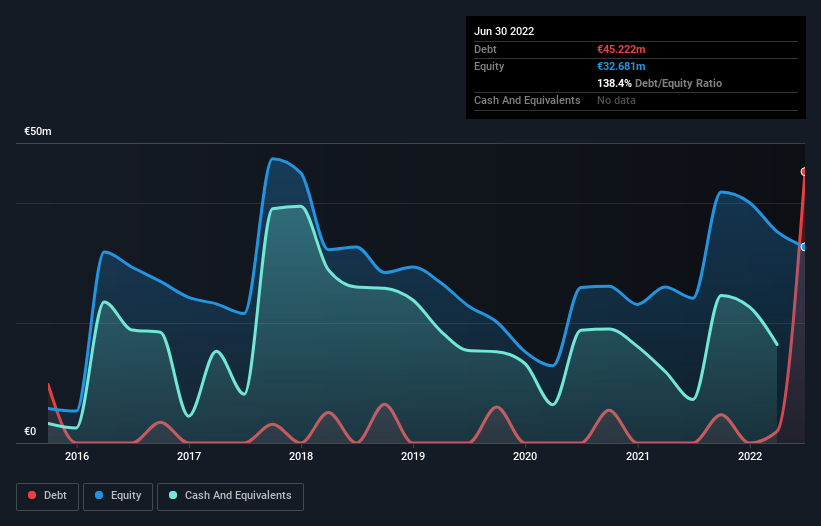The external fund manager backed by Berkshire Hathaway's Charlie Munger, Li Lu, makes no bones about it when he says 'The biggest investment risk is not the volatility of prices, but whether you will suffer a permanent loss of capital.' It's only natural to consider a company's balance sheet when you examine how risky it is, since debt is often involved when a business collapses. We note that BRAIN Biotech AG (ETR:BNN) does have debt on its balance sheet. But the more important question is: how much risk is that debt creating?
What Risk Does Debt Bring?
Debt assists a business until the business has trouble paying it off, either with new capital or with free cash flow. If things get really bad, the lenders can take control of the business. While that is not too common, we often do see indebted companies permanently diluting shareholders because lenders force them to raise capital at a distressed price. Of course, the upside of debt is that it often represents cheap capital, especially when it replaces dilution in a company with the ability to reinvest at high rates of return. When we think about a company's use of debt, we first look at cash and debt together.
See our latest analysis for BRAIN Biotech
What Is BRAIN Biotech's Net Debt?
As you can see below, at the end of June 2022, BRAIN Biotech had €45.2m of debt, up from none a year ago. Click the image for more detail. However, because it has a cash reserve of €16.4m, its net debt is less, at about €28.8m.

How Healthy Is BRAIN Biotech's Balance Sheet?
Zooming in on the latest balance sheet data, we can see that BRAIN Biotech had liabilities of €17.0m due within 12 months and liabilities of €28.2m due beyond that. On the other hand, it had cash of €16.4m and €8.54m worth of receivables due within a year. So its liabilities outweigh the sum of its cash and (near-term) receivables by €20.2m.
Since publicly traded BRAIN Biotech shares are worth a total of €128.0m, it seems unlikely that this level of liabilities would be a major threat. But there are sufficient liabilities that we would certainly recommend shareholders continue to monitor the balance sheet, going forward. There's no doubt that we learn most about debt from the balance sheet. But it is future earnings, more than anything, that will determine BRAIN Biotech's ability to maintain a healthy balance sheet going forward. So if you want to see what the professionals think, you might find this free report on analyst profit forecasts to be interesting.
In the last year BRAIN Biotech wasn't profitable at an EBIT level, but managed to grow its revenue by 30%, to €48m. With any luck the company will be able to grow its way to profitability.
Caveat Emptor
Despite the top line growth, BRAIN Biotech still had an earnings before interest and tax (EBIT) loss over the last year. Indeed, it lost €5.5m at the EBIT level. Considering that alongside the liabilities mentioned above does not give us much confidence that company should be using so much debt. So we think its balance sheet is a little strained, though not beyond repair. However, it doesn't help that it burned through €3.2m of cash over the last year. So to be blunt we think it is risky. When analysing debt levels, the balance sheet is the obvious place to start. However, not all investment risk resides within the balance sheet - far from it. We've identified 1 warning sign with BRAIN Biotech , and understanding them should be part of your investment process.
At the end of the day, it's often better to focus on companies that are free from net debt. You can access our special list of such companies (all with a track record of profit growth). It's free.
Valuation is complex, but we're here to simplify it.
Discover if BRAIN Biotech might be undervalued or overvalued with our detailed analysis, featuring fair value estimates, potential risks, dividends, insider trades, and its financial condition.
Access Free AnalysisHave feedback on this article? Concerned about the content? Get in touch with us directly. Alternatively, email editorial-team (at) simplywallst.com.
This article by Simply Wall St is general in nature. We provide commentary based on historical data and analyst forecasts only using an unbiased methodology and our articles are not intended to be financial advice. It does not constitute a recommendation to buy or sell any stock, and does not take account of your objectives, or your financial situation. We aim to bring you long-term focused analysis driven by fundamental data. Note that our analysis may not factor in the latest price-sensitive company announcements or qualitative material. Simply Wall St has no position in any stocks mentioned.
About XTRA:BNN
BRAIN Biotech
Provides bio-based products and solutions in Germany, the United States, France, the Netherlands, and the United Kingdom.
Excellent balance sheet with reasonable growth potential.
Market Insights
Community Narratives


Recently Updated Narratives

TAV Havalimanlari Holding will fly high with 25.68% revenue growth


Fiducian: Compliance Clouds or Value Opportunity?


Q3 Outlook modestly optimistic
Popular Narratives


MicroVision will explode future revenue by 380.37% with a vision towards success


The company that turned a verb into a global necessity and basically runs the modern internet, digital ads, smartphones, maps, and AI.



